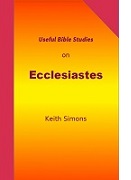Useful Bible Studies > Ecclesiastes Commentary > chapter 1
What can people achieve during their lives?
Ecclesiastes 1:1-3
Ecclesiastes 1:3 tells us the main subject in the Book of Ecclesiastes. It asks what a person really achieves by all his hard work in this world.
Jesus asked a very similar question in Matthew 16:26. His opinion was that, without a right relationship with God, a person achieves nothing worthwhile. Of course a person may become rich or famous but these things do not last. At death, that person loses all such things. And afterwards, nothing matters except that personís relationship with God.
The Book of Ecclesiastes uses Solomonís life to teach that lesson. Solomon was the Ďteacherí or Ďleaderí that Ecclesiastes 1:1 refers to. He was Israelís greatest king, and he made his country wealthy. He was wise, and he became famous.
We may consider that Solomon achieved great things in his life. Certainly, Solomon worked hard and his efforts seemed successful (Ecclesiastes 2:4-9). But the Book of Ecclesiastes tells us the truth about Solomonís life. That is, it shows us Godís opinion about Solomonís greatness.
Towards the end of his life, Solomon was not loyal to God. Formerly, Solomon had a close relationship with God. But Solomon lost that, and he even began to serve false gods (1 Kings 11:7-10).
And after Solomonís death, the things that he had achieved did not last. There were wars and great troubles in Israel. The country lost much of its wealth, and the new king lost much of his authority.
Even such a great man as Solomon could achieve nothing that lasted. He seemed such a powerful man, but in Godís opinion, Solomonís best efforts were very weak. They were as weak as Solomonís own breath, because, in the end, Solomon was just a man. And all people must die.
In the original language, Ecclesiastes 1:2 repeats the same word 5 times. It does that in order to emphasise the word in the strongest possible manner. The King James Bible translates that word Ďvanityí, which means Ďin vainí or Ďwithout purposeí. It is a description of all that people can achieve in their lives.
Some people translate that word Ďjust a breathí. A personís work is as weak as his breath, because all people must die. So the word Ďbreathí is a word-picture for peopleís weakness. But the Bible compares Godís work to a great wind or a powerful storm (Psalm 29; John 3:8; Acts 2:2).
A personís breath seems very weak when we think about the wind during a great storm. And even the work of a powerful king seems very weak when we think about Godís work.
The Book of Ecclesiastes does not say much about Godís work in peopleís lives. Its subject is what people can achieve without a right relationship with God. But right at the beginning, the book reminds us about someone who really did have a right relationship with God. That person was King David (Ecclesiastes 1:1). David did not obtain that relationship with God because of his own works (Romans 4:4-8). David had that relationship because he genuinely loved God (1 Kings 11:4). God wants everyone to do that (Mark 12:29-30). People who love God do his work, not their own work. And Godís Holy Spirit makes them strong (Galatians 6:8; Ephesians 6:10-11).
Next part: Who can change the world? (Ecclesiastes 1:4-7)
 Please use the links at the top of the page to find our other articles in this series. If you find these articles useful, you will like our book, available from Amazon.
Please use the links at the top of the page to find our other articles in this series. If you find these articles useful, you will like our book, available from Amazon.
You can download our articles on several Bible books, free, from our download page (including our free 1000+ page course book).
© 2019, Keith Simons.